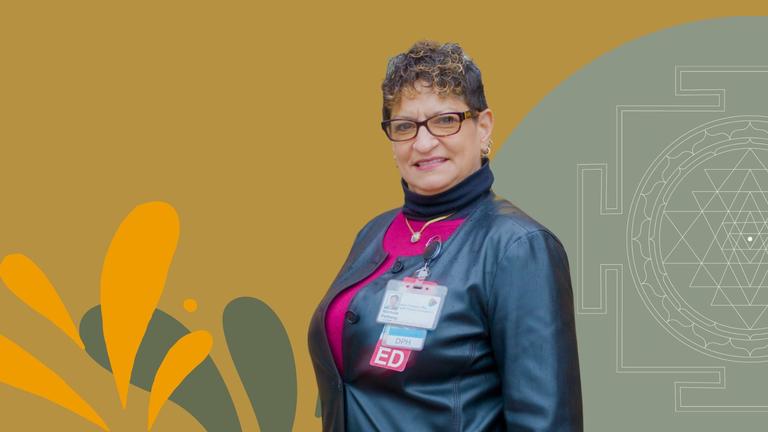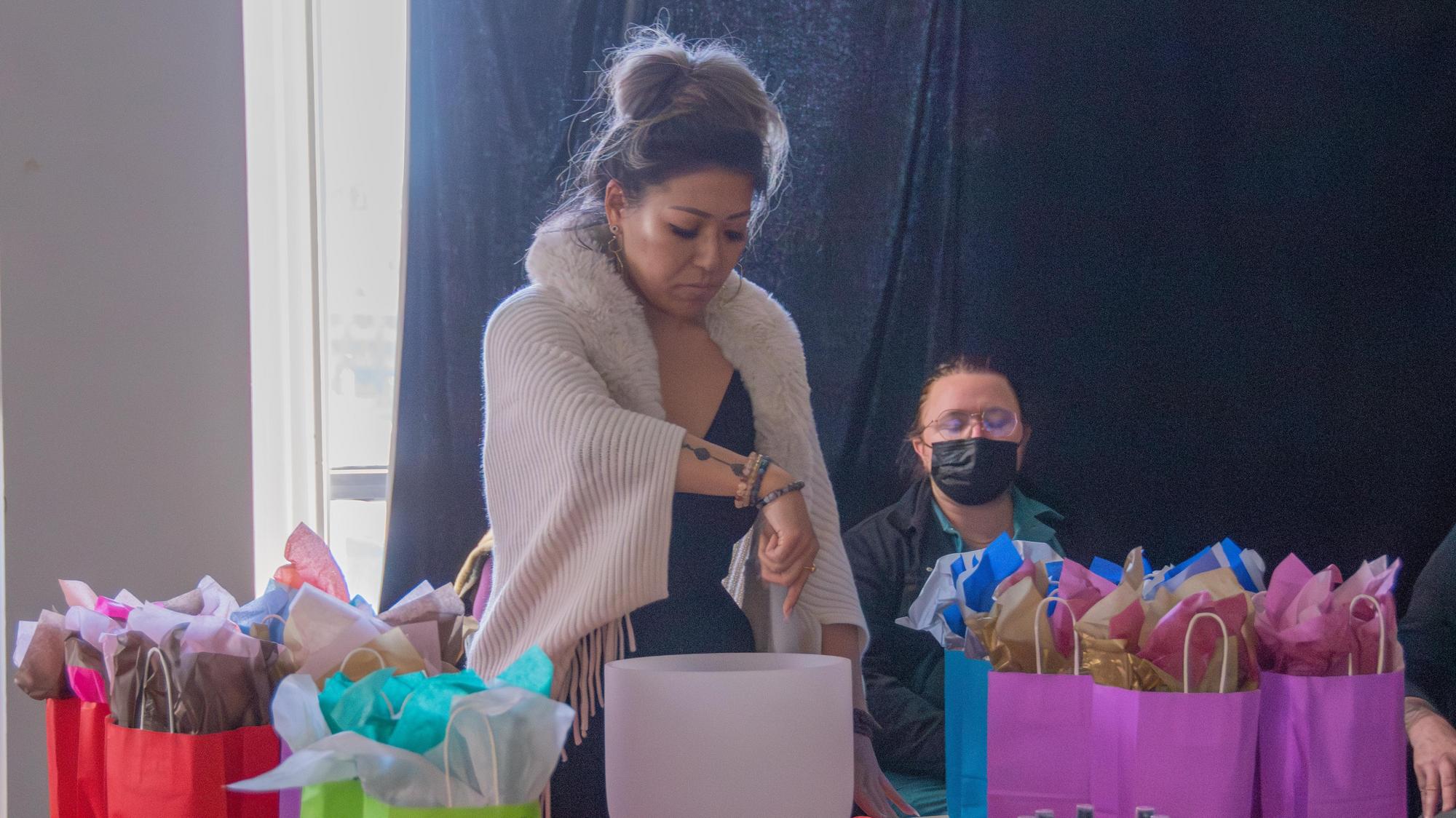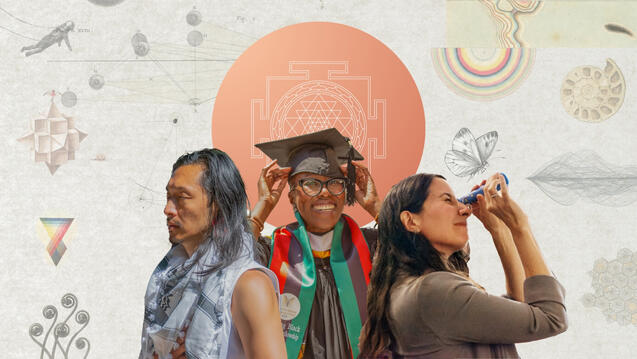Transformative Leadership alum Cynthia Huie, M.A. '24, brings creativity and connection to the San Francisco small-business community.

Building Bridges to Shore
Community Mental Health alumna Nichole Pettway on using her experiences to help others navigate uncharted waters
I feel that it is incumbent upon me, [having] come from that dark place in my life, to help someone else who may be struggling to make it to shore.
As the Program Manager of Social Medicine for the fast-paced emergency room of Zuckerberg San Francisco General Hospital and Trauma Center, Nichole Pettway and her team do more than just connect patients to the right specialists for their most urgent complaints. Drawing on her training in CIIS’ Community Mental Health master’s program, Pettway does her best to supervise her team of health workers and connect patients in need — often those with chronic issues such as hunger, substance abuse, or unstable access to mental health care or medication — with resources beyond whatever brought them into the ER.
It is far from an easy job: San Francisco General is the largest area hospital providing acute and rehabilitative psychiatric care, and the only San Francisco hospital offering 24/7 emergency psychiatric care. In addition, it is unusual among large research and teaching hospitals in that it is a public institution, run by the San Francisco Department of Public Health, and a safety net hospital charged with providing care to all San Franciscans regardless of income or immigration status, in over 20 languages. Pettway’s team includes two patient care coordinators, and navigators for substance use disorder and food insecurity.
Often, patients who are struggling in multiple ways turn up in the ER for lack of anywhere else to go, and Pettway and her staff triage with the physicians, nurses, and social workers to determine whether patients need emergency admission or connection to other supportive services — identifying, as she says, “patients whose chronicity of social issues is higher than their chronicity of medical issues.”
In her work, Pettway draws on her own life experiences: as an African American, the mother of a disabled daughter, a recovering addict, a survivor of abuse, and a formerly incarcerated person, Pettway knows the struggles of her patients firsthand. As she says, “I feel that it is incumbent upon me, [having] come from that dark place in my life, to help someone else who may be struggling to make it to shore.” When she started in her current role at San Francisco General, Pettway struggled with imposter syndrome from the disparities between her background and those of her med school-trained, published colleagues. But one notably told her, “You're more qualified to be here than anybody else because you come with a life experience that helps us treat the client that you used to be.”
“I've held onto that,” Pettway says. “I've walked with my head high.”
Her own bridge to shore was far from easy to cross, but a truly remarkable journey. Starting in 2009 with no high school education and many barriers to overcome, Pettway was able to earn her high school diploma from John Adams Community College. She went on to study for four years at City College of San Francisco and ultimately completed a B.S. from the University of Phoenix. After working for supportive programs for those with substance abuse disorder and the formerly incarcerated, Pettway decided to apply to CIIS to earn an M.A. in Community Mental Health, an education that she hoped would enable her to “be the best clinician” that she could be for these vulnerable communities.
Despite starting grad school in the fall of 2019 and getting only one in-person semester before the start of the COVID-19 pandemic, she found her experience at CIIS transformative. If anything, the context of the pandemic made her coursework and connections to her cohort feel even more vital, underscoring the essential nature of community mental health. Pettway and her fellow students “uplifted each other and supported each other through this very difficult process of working as essential workers, working with folks who were very vulnerable populations, trying not to get Covid [them]selves and also being able to manage and navigate through this mental health program in uncharted waters.”
Pettway was also profoundly inspired by the courses in Black psychology that she took during her degree, which she feels enabled her to both process her own background and better serve her community. “I think I brought the sauce,” Pettway says of being able to use her experiences in life and work as a lens for class discussion. “Understanding how to deal with trauma in our society for people of color,” she says, “was the most rewarding aspect of CIIS. The instructors were talking about some very sensitive information, sensitive things about generational dysfunction and the trauma of how Black people have been treated in America. But we did it with diversity and inclusion. We did it with a sense of pride, and we did it with a lot of humility.” That humility and consideration, she feels, enables clinicians to “sit with another individual and allow them to go through their [struggles] without your own personal bias,” adding, “I really learned that from CIIS.” Pettway singled out the leadership of Rachel Bryant, CIIS’ Vice President of Diversity, Equity, and Inclusion (herself a graduate of the Community Mental Health program), for providing invaluable grounding and support for students of color at CIIS.
In addition to her work at San Francisco General, Pettway has also started a nonprofit — The Building Bridges Foundation — to support the formerly incarcerated, assist them from day one with community support and resources, and end recidivism. Building Bridges, she says, is about forging wide-reaching and deep connections with people, and learning to trust others and the process. “It takes a lot of perseverance. It takes a lot of resilience. And I did not know that I possessed what it took. And so I allowed someone else to believe in me until I believed in myself enough, and I held someone's hand, and then I held another hand, and I held another hand until I had a support system so strong that I was able to sustain.” Pettway cites the community of fellow students and instructors at CIIS as an integral part of that support system. The “family of folks that I engaged with at CIIS instilled so much hope in me, instilled so much encouragement to continue on.” She recently received an honorary doctorate from Trinity School of Business for her work, and her book Against All Odds: A Triumphant Journey from Addiction and Incarceration was published in June 2024.
Pettway continues to build bridges at CIIS, too, offering support to any current students: “I do have internships available for mental health students,” she exhorts. “Reach out to me.”
Related Academic Program

To support students like Nichole Pettway in pursuing their clinical degrees, please consider donating to our fundraising campaign to diversify the mental health workforce.
To learn more about the Community Mental Health program, one of CIIS’ five Counseling Psychology master’s programs, visit the program page or reach out to one of our admissions counselors.
Related News
A panel hosted by the Department of Human Sexuality gathered notable alumni from the Ph.D. program to discuss their change-making work and research.
At each CIIS Open House event, a community panel of faculty and alumni discusses what drew them to CIIS and their experiences at the University.



